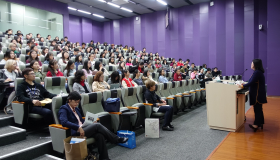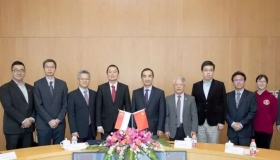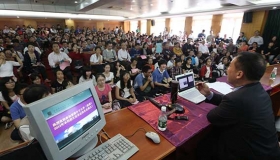Professor Shouchang Wang on Chinese Wisdom
On the afternoon of February 26, the eleventh Chinese Culture Colloquium was launched. Professor Wang from Peking University shared his thoughts on Chinese culture and wisdom.
“Culture cannot be simply identified as advanced or backward,”
Professor Wang pointed out that Chinese culture are often blindly labeled as conventional or backward. This thinking is largely affected by productivity level——Chinese agricultural civilization appeared inferior to western industrial civilization in ancient times. However, culture is a broad concept containing both essence and dross. It’s irresponsible to depict a civilization simply as advanced or backward.

Afterwards, Prof. Wang brought forward the concept of theoretical criticism and political criticism. The former focuses on rigorous academic research while the latter lays emphasis on the effect the concept will have when applied in society. A concept can easily be garbled or even misinterpreted during the transition from the former to the latter. The excessive political criticism towards Chinese culture after the May Fourth Movement has contributed to a certain degree of misunderstanding of Chinese culture. A case in point is the adage of “preservingthe heavenly principle and exterminatinghuman desires”. Taken literally, it is often seen as a proof that Confucianism suppresses human nature; but if viewed in relation to the context, the author Zhu Xi was not against such basic human desires as food or sex. What he despises is over-consumption and ignorance of natural laws.
To help students truly understand Chinese culture and wisdom, Prof. Wang also elaborated on the concept of Middle Kingdom, The origin of which stems from the term
“Hua Xia” inIntrigues of the Warring States.“The garnish of dress” is “Hua” while “the great etiquette” is “Xia”. Geographically speaking, the concept of Middle Kingdom embodies the simple wisdom of our ancestors——“Middle Kingdom on the inside, barbarians on the outside”, “Five stars rising from the east bode well for Middle Kingdom” etc.

Professor Shouchang Wang
Finally, Prof. Wang talked about Chinese wisdom. Chinese culture emphasizes the relationship between intelligence and virtue, believing that “Morality lies in and dictates tactics”, meaning that wisdom must be used under the guidance of moral standards. The biggest difference betweenThirty-Six StratagemsandThe Art of Waris that the former deviates from morality and degrades into deception. Another critical concept in Chinese wisdom is “Golden Mean”: going beyond the limit is as bad as falling short of it and it’s important to do everything “just right”. It also stresses “consider both ends and find the balance”: when falling into contradictions, you can make more rational decisions if you see things from a third perspective. Although it’s improper for men and women to touch each other’s hand in passing objects, exceptions abound, particularly when you are trying to save a drowning person. “One should not impose on others what he himself does not desire”, a concept lauded by the UN, is just one of those millions of examples showcasing Chinese wisdom.

Professor Yang Gu and Professor Shouchang Wang




